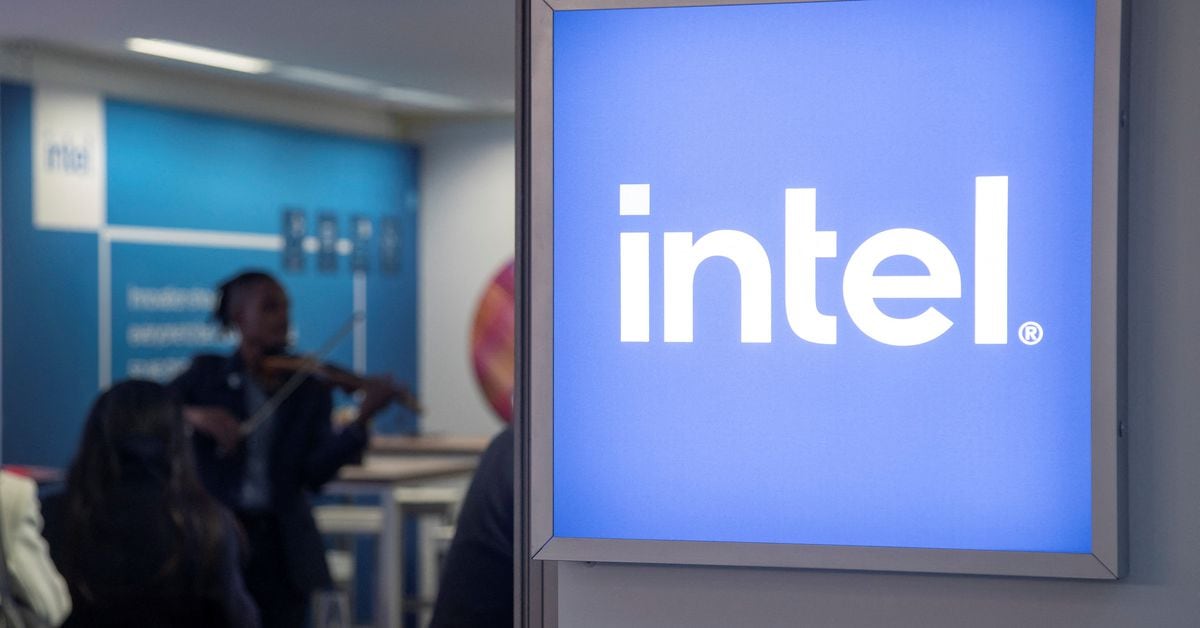Yuck. Revenue down 32% and again they lost money.
CCG revenue down 36%, DCG down 33%... that in Q4 compared to previous year.
Q1 Guidance is even worse... revenue down 40% YoY.
Wanted to answer as well, but I couldn't have described it better.
Just one point to add: Intel needs to keep their stock from plummeting. Because otherwise they might become a real bargain for a hostile takeover from the likes of Apple, Alphabet, Amazon or someone else with deep pockets.
Wanted to answer as well, but I couldn't have described it better.
Just one point to add: Intel needs to keep their stock from plummeting. Because otherwise they might become a real bargain for a hostile takeover from the likes of Apple, Alphabet, Amazon or someone else with deep pockets.

Just more welfare for the rich.... Great...
Intel wants 10 bln euros of government funding for plant in Germany -Handelsblatt
Intel has provided the German economy ministry with a new calculation for a planned chip factory in the city of Magdeburg that considers almost 10 billion euros ($10.74 billion) of government funding to be necessary, business daily Handelsblatt reported on Wednesday, citing government sources.www.reuters.com
Intel's plan is just to get governments to pay for everything. Socialize the cost and privatize the profits.
No need to cut dividend if they just ask for more money.
Since x64 is AMD's it's a cross licensing agreement and goes both ways these days indeed.Does Intel have that x86 patent nullification poison pills like AMD has? I'd say the reason AMD was never bought and stripped for parts during their dark days was their best parts wouldn't have been part of the bargain.
The patents on the x86 stuff have long expired. Same with *most* of the x64 things. There are a few more modern extensions that are likely still covered though. It would be interesting to see someone like Samsung or Mediatec build a basic x86 + x64 CPU without the extensions still covered.Does Intel have that x86 patent nullification poison pills like AMD has? I'd say the reason AMD was never bought and stripped for parts during their dark days was their best parts wouldn't have been part of the bargain.
It's not just patents. The Google vs. Oracle lawsuit established that APIs are copyrightable which I'd expect to cover ISAs like x86 as well. Without agreement with Intel and/or AMD and their cross licensing agreement permitting such external agreements as well any implementations are legal grey area. I guess emulation is generally considered fair use by now. But I can imagine Intel/AMD asking for injunctions when somebody successfully tries to re-implement x86 compatible with modern software in hardware.The patents on the x86 stuff have long expired. Same with *most* of the x64 things. There are a few more modern extensions that are likely still covered though. It would be interesting to see someone like Samsung or Mediatec build a basic x86 + x64 CPU without the extensions still covered.
It's not just patents. The Google vs. Oracle lawsuit established that APIs are copyrightable which I'd expect to cover ISAs like x86 as well. Without agreement with Intel and/or AMD and their cross licensing agreement permitting such external agreements as well any implementations are legal grey area. I guess emulation is generally considered fair use by now. But I can imagine Intel/AMD asking for injunctions when somebody successfully tries to re-implement x86 compatible with modern software in hardware.
They didn't AFAIRHow about Transmeta back then? They also had no x86 license, had they?
/edit: Because they did hardware emulation IIRC.
Transmeta was known for the software layer called Code Morphing Software. As Wikipedia puts it:They didn't AFAIR


Now Intel is cutting their dividend to a third of it's current value, from $.365/share to $.125/share. So 96 cents less expenditure per share each year, with over 1 billion shares outstanding that means Intel will have roughly an extra billion each year to work with.
I don't pretend to understand semiconductors or finance that well, but based on what I've read this was probably overdue and I was surprised they didn't announce the cut during the Q4 earnings. I wonder if something happened between now and then or if it was planned all along.
I don't pretend to understand semiconductors or finance that well, but based on what I've read this was probably overdue and I was surprised they didn't announce the cut during the Q4 earnings. I wonder if something happened between now and then or if it was planned all along.


Now Intel is cutting their dividend to a third of it's current value, from $.365/share to $.125/share. So 96 cents less expenditure per share each year, with over 1 billion shares outstanding that means Intel will have roughly an extra billion each year to work with.
I don't pretend to understand semiconductors or finance that well, but based on what I've read this was probably overdue and I was surprised they didn't announce the cut during the Q4 earnings. I wonder if something happened between now and then or if it was planned all along.
The Google vs. Oracle lawsuit established that APIs are copyrightable
wow... I knew things were bad at Intel but not this bad...
Intel slashes dividend by over 65%
Eh? The whole fair use clause relies on something already having been copyrighted, and for that to be possible it has to be copyrightable. So this is absolutely what happened. And while this may be a tenuous distinction from a PoV within the US, it becomes critical outside of the US where copyright is enforceable but the whole concept of fair use is by far not as widespread.This is not what happened. The Federal Circuit ruled that APIs are copyrightable, but the Supreme Court granted certiorari and then resolved the case in Google's favor without touching the copyrightability of APIs part, by ruling that even if APIs are copyrightable, Google had fair use protections that allowed them to use them.
Execs probably needed extra time to sell their stock. (The Stock was down 5% yesterday, presumably because the details of the cut leaked out early)
Pat Gelsinger paid $250,000
would have prefer them stop the dividend but still a good move for long term health of the company. Stock should drop more in the coming days
I’m sure it was planned. Timing wise, I’m sure they wanted to get through the payout of the most recent dividend (happened after the earnings report) before announcing the cut. With that said, I do think that it is overdue and announcing the employee salary/benefit cuts and firings first was not that smart.

Intel CEO Pat Gelsinger told employees that the company will restore the base salary back to 100 percent for impacted staff in October. The chipmaker also plans to bring back quarterly profit bonuses in the third quarter, with payouts beginning the same month.
Eh? The whole fair use clause relies on something already having been copyrighted, and for that to be possible it has to be copyrightable. So this is absolutely what happened. And while this may be a tenuous distinction from a PoV within the US, it becomes critical outside of the US where copyright is enforceable but the whole concept of fair use is by far not as widespread.
Again, within the US. The last actual decision on this (the first appellate ruling) was that APIs are copyrightable. The Supreme Court based its decision on the assumption that APIs are copyrightable and concluded that it doesn't matter due to the fair use clause, so no further clarification was made on the topic since deemed unnecessary. Outside of the US the whole concept of fair use sees little use though.No, that's not how law works. The SC didn't rule that the subject matter is copyrightable, they ruled that in this case it didn't matter, because either it is not copyrightable and google is in the clear, or if it is copyrightable, google had fair use rights and win the case that way, so they chose to not touch the question.
This kind of reasoning is common in US law, because of binding precedent and the very strong convention that courts should not produce more precedent than what is necessary to rule on the cases in front of them. As of right now, no precedent exists in the USA for the copyrightability of APIs.

Intel Vows To Restore Staff Salaries In Fall As EMEA Head Resigns | CRN
Intel tells staff it will restore their base pay in October as the head of the company's EMEA business resigns, CRN has learned.www.crn.com


